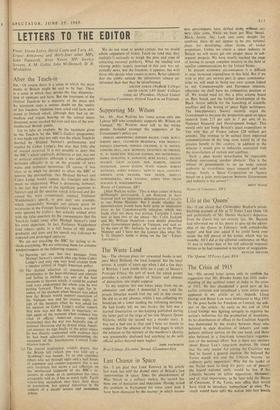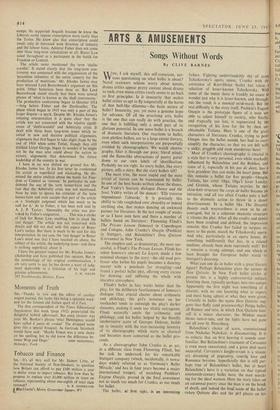The Crisis of 1915
SIR,---His second letter serves only to confirm the suggestion that Mr. Rhodes James has little under- standing of the cardinal issues at stake in the crisis of 1915. He has abandoned a good part of his earlier criticism and introduced a term which never appeared in my article at all. Asquith. Lloyd George and Bonar Law were dominated in May 1915 by the great battle for Freedom or Control, the sub- ject of the article. As early as the end of 1914 Lloyd George was fighting savagely to organise the nation's industries for the production of munitions. In his distribution of offices in the Coalition Asquith was dominated by the rivalry between those who believed in state direction of industry and com- pulsory military service on the one hand, and those who believed in a free-trade laissez-faire organisa- tion of the national effort. Nor is there any mystery about Bonar Law's long-term motives. He stated that 'his only reason' for joining the Coalition was that he feared a general election. He believed the Tories would win and the Liberals become 'an ordinary party opposition.' Why did the leader of the Tories want to keep his party out of power? He feared national unity would be lost it the Liberals became an active opposition. Moreover, and of vital importance, as he later told the House of Commons, if the Tories won office they would have tried to introduce 'compulsion' at once. The result would have split the nation into two hostile camps. He supported Asquith because he knew the Liberals could impose conscription more easily than the Tories. He knew also that conscription could result only in increased state direction of industry and the labour force. Admiral Fisher does not come into these long-term calculations at all. Bonar Law acted throughout as a participant in the battle for Freedom or Control.
The article never mentioned the term 'shells- scandal.' It stated clearly that the long-term con- troversy was concerned with the organisation of the 'peacetime industries of the entire country for the production of munitions.' Mr. Rhodes James may have misread Lord Beaverbrook's argument on this point. Other historians have done so. But Lord Beaverbrook stated clearly that there were several phases of 'what is known as the shell controversy.' The production controversy began in October 1914 —long before Fisher and the Dardanelles. The phase which began in 1915 was only a part of this larger dispute—a spark. Despite Mr. Rhodes James's amazing interpretation it is quite clear that the article was not concerned with the relative signifi- cance of 'shells-scandal' and Admiralty crisis. It dealt with those basic long-term issues which re- sulted in new and decisive political .alignments, alignments that first began to take slight shape by the end of 1914 when some Tories, though they still disliked Lloyd George, began to wonder if he might not be the man who could direct the nation to victory, alignments that determined the future leadership of the country in war.
I have in no way shifted my ground but Mr. Rhodes James has. In his first letter he condemned the article as superficial and misleading. He dis- missed the entire analysis about the battle for Free- dom or Control as 'curious.' In particular he con- demned the use of the term laissez-faire and the fact that the Admiralty crisis was not mentioned. Now he tries to ignore his criticism of the term laissez-faire and even accepts that part of the article . as a 'hindsight judgment which has much to be said for it.' As to Fisher, it has been well said by A. J. P. Taylor: 'Ostensibly the crisis was pro- voked by Fisher's resignation. . . . This was a stroke of luck for Bonar Law, enabling him to cloak the real danger.' The article was not concerned with details and did not deal with this aspect of Bonar Law's tactics. But there is much to be said for this interpretation. In any case, the 'real danger' in Bonar Law's mind was that I have touched on above, the subject of the article, thy underlying issue—and there is nothing superficial about it.
I have the greatest respect for Mr. Rhodes James's scholarship and have published this opinion. But in the terminology of his original communication, I am very sorry to say, he has shown a want of judg- ment deplorable in a historian of his high and







































 Previous page
Previous page